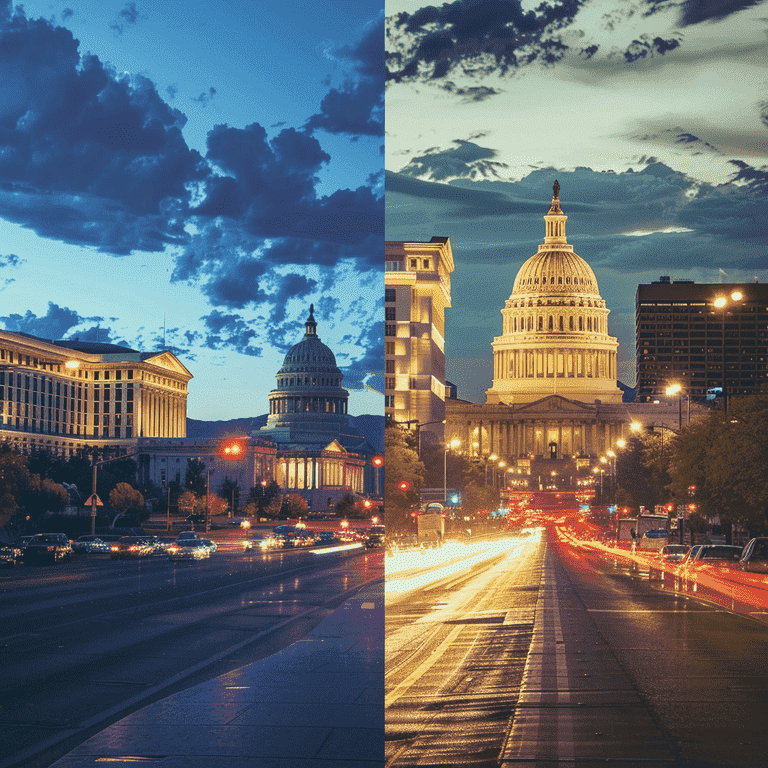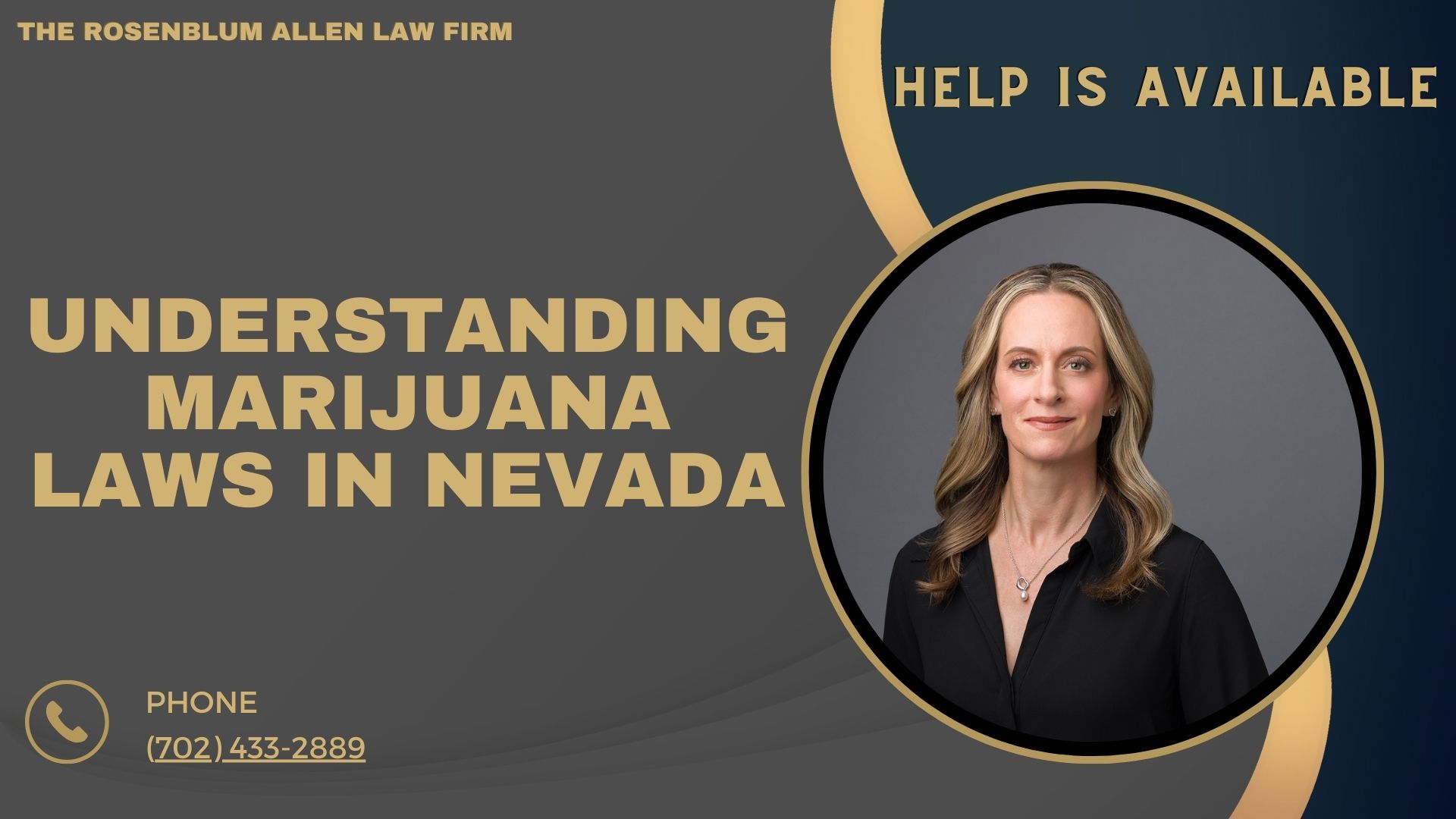Marijuana laws in Nevada have evolved significantly in recent years, transforming the landscape for both medical and recreational users. As one of the states that legalized both medical and recreational cannabis, Nevada has unique rules that everyone—from patients to casual users and business owners—needs to understand.
This guide covers the essential aspects of marijuana laws in Nevada. Whether you’re a medical patient looking to understand your rights, a recreational user curious about legal limits, or a business owner navigating dispensary regulations, this guide is for you.
Background on Marijuana Legalization in Nevada
Nevada has come a long way from strict cannabis prohibition to becoming a state where marijuana use is legal for both medical and recreational purposes. Here’s a brief look at how it all happened:
- 1998 and 2000: Nevada voters approved medical marijuana through a ballot measure, setting the stage for patient use.
- 2016: Voters passed the Regulation and Taxation of Marijuana Act, legalizing recreational marijuana for adults over 21.
- 2017: Recreational sales officially began, making cannabis accessible to a broader audience.
Nevada’s approach to cannabis reflects changing public attitudes and the desire for regulated safe access. However, users must follow these laws with specific conditions and restrictions.
Current Marijuana Laws in Nevada
Cannabis is legal in Nevada, but regulations differ significantly between medical and recreational use. Understanding these distinctions is crucial to staying compliant with the law.
- Medical Marijuana: Legal for patients with qualifying medical conditions who have obtained a state-issued Medical Marijuana Card.
- Recreational Marijuana: Legal for adults 21 and older with specific possession limits and restrictions on where it can be used.
Key Points:
- Marijuana use is only allowed on private property. Public use remains illegal.
- Driving under the influence of marijuana is strictly prohibited.
- Only licensed dispensaries can sell cannabis products.
Medical Marijuana in Nevada
Medical marijuana was Nevada’s first step toward legalization. The program allows patients with specific medical conditions to access cannabis as part of their treatment plan.
Qualifying for a Medical Marijuana Card
To legally purchase and use medical marijuana in Nevada, you need a Medical Marijuana Card. Here’s how to qualify:
- Eligible Conditions: Chronic pain, cancer, PTSD, glaucoma, AIDS, epilepsy, and other chronic or debilitating conditions.
- Application Process:
- Obtain a recommendation from a Nevada-licensed physician.
- Submit the physician’s recommendation and application to the Nevada Division of Public and Behavioral Health.
- Pay the application fee and await approval.
- Renewal Requirements: Cards are typically valid for one year. Renewal requires a physician’s review and updated application.
Patient Rights and Responsibilities
Holding a Medical Marijuana Card gives patients certain rights, but it also comes with responsibilities.
Rights:
- Legal Protections: Cardholders are protected from state-level prosecution for possession and use within legal limits.
- Possession Limits: Patients may possess up to 2.5 ounces of usable marijuana per 14-day period.
- Cultivation: If a dispensary is not within 25 miles of their residence, patients may grow up to 12 plants.
Responsibilities:
- No Sharing: Patients cannot share or sell their marijuana to others.
- Use in Private: Consumption is only allowed on private property and never in public or vehicles.
Caregivers and Minor Patients
Patients who cannot manage their cannabis use may designate a caregiver. Caregivers can assist with purchasing, transporting, and administering marijuana.
Caregiver Rules:
- Must be at least 21 years old.
- They cannotOnly serve one patient if they are family members.
- Subject to background checks and approval.
Minor Patients:
- Must have consent from a parent or guardian.
- The parent or guardian must act as the caregiver.

Recreational Marijuana Use
Recreational marijuana is legal in Nevada, but it’s not a free-for-all. There are strict rules in place to keep things safe and orderly. Here’s what you need to know if you’re using cannabis for fun, not medical reasons.
Age and Possession Limits
In Nevada, the rules are straightforward but strict when it comes to who can legally use recreational marijuana.
- Age Requirement: You must be 21 or older to buy, possess, or use recreational cannabis.
- Possession Limits: You can legally have:
- Up to 1 ounce of cannabis flower (dried marijuana).
- Up to 1/8 of an ounce of concentrated marijuana (like oils or edibles).
These limits are in place to prevent misuse and keep possession reasonable.
Home Cultivation Rules
If you prefer to grow your cannabis, Nevada has specific rules about who can do it and where.
- Eligibility to Grow: You can only grow marijuana if:
- There is no licensed dispensary within 25 miles of your home.
- You own or have permission from the property owner to cultivate on the property.
- Plant Limits:
- You are allowed up to 6 plants per person.
- A household can have up to 12 plants, regardless of the number of people living there.
- Cultivation Location: Plants must be enclosed, like a locked closet, room, or greenhouse. They should not be visible to the public.
These cultivation rules are designed to balance personal freedom with community safety.
Public Consumption Restrictions
One of the most misunderstood aspects of Nevada’s marijuana laws is where you can use it. Spoiler alert: It’s not in public.
- Where You Can Use:
- Private homes or properties where the owner allows it.
- Where You Cannot Use:
- In public spaces like parks, sidewalks, or streets.
- In casinos, hotels, or any property that forbids marijuana use.
- In a vehicle, whether you’re the driver or a passenger.
Penalties for Public Use: Consuming marijuana in public can result in a hefty fine. It’s considered a misdemeanor and can also land you in trouble with law enforcement.
Dispensary Regulations
Nevada’s dispensaries are the only legal places to buy cannabis. They’re highly regulated to ensure safety, quality, and compliance with the law.
Licensing and Compliance for Dispensaries
Opening a dispensary in Nevada isn’t easy. The state keeps tight control over who can sell marijuana to maintain a safe and reliable market.
- Licensing Requirements:
- Dispensaries must go through a rigorous application process.
- Owners undergo background checks to ensure they have no disqualifying criminal history.
- Compliance Standards:
- Regular inspections by state regulators.
- Strict inventory tracking to prevent illegal sales.
- Dispensaries must adhere to zoning laws and be located away from schools and public facilities.
Product Safety Standards
Product safety is paramount in Nevada’s marijuana market. Dispensaries must meet strict testing and labeling requirements to ensure products are safe for consumers.
- Mandatory Testing:
- All cannabis products are tested for potency (THC and CBD levels).
- Screening for contaminants like mold, pesticides, and heavy metals.
- Labeling Requirements:
- Clear labeling with information on THC content, dosage instructions, and ingredients.
- Warnings about potential effects and keeping products away from children.
This system protects consumers from harmful substances and ensures they know exactly what they’re buying.

Driving and Marijuana
Driving under the influence of marijuana is illegal and dangerous. Nevada has clear rules to keep the roads safe.
DUI Laws for Marijuana Use
Just like with alcohol, driving high can impair your ability to operate a vehicle safely.
- Legal THC Limits: The legal limit for THC in your blood while driving is:
- Two nanograms per milliliter for THC.
- Five nanograms per milliliter for marijuana metabolite.
- Penalties for DUI:
- Fines, mandatory DUI classes, and possible jail time.
- A DUI conviction can lead to license suspension and increased insurance costs.
Law enforcement uses field sobriety tests and chemical tests to determine impairment, so it’s best not to drive if you’ve consumed marijuana.
Transporting Marijuana in Vehicles
Nevada’s rules on transporting cannabis are similar to alcohol open container laws.
- Open Container Rules:
- Marijuana must be stored in a sealed container.
- It should not be accessible to the driver or passengers; ideally, it should be kept in the trunk.
- Penalties for Violations:
- Fines and potential misdemeanor charges for having an open container in the vehicle.
Keeping cannabis out of reach while driving helps you stay on the right side of the law.
Employment Considerations and Marijuana
Marijuana legalization in Nevada doesn’t necessarily mean you’re free to use it whenever you want, especially when it comes to work. Employers still have the right to set their policies regarding marijuana use, even if it’s legal in the state. Here’s what you need to know about how marijuana laws intersect with the workplace.
Employee Rights
If you’re a medical marijuana patient, you might have some protections at work, but they are limited. Here’s a breakdown of what you can expect:
- Medical Marijuana Patients:
- Nevada law does not require employers to accommodate medical marijuana use at work.
- However, employers cannot discriminate against you solely because you are a medical marijuana patient.
- If you test positive, but the marijuana use does not affect your job performance, you might have some legal grounds to contest actions like termination.
- Recreational Users:
- Recreational use offers no protections at work. Employers can still enforce drug-free workplace policies and take action if you test positive.
Employer Drug Testing Policies
Employers in Nevada can still test for marijuana use, and many do, especially in safety-sensitive industries like transportation, healthcare, and construction.
- Pre-Employment Testing:
- Most employers can require a drug test before hiring. A positive result can mean you don’t get the job, even if marijuana is legal.
- Random and Post-Incident Testing:
- Employers can conduct random drug tests or tests after workplace incidents. These tests help ensure safety and compliance with company policies.
- Safety-Sensitive Positions:
- Employers have stricter testing standards for jobs where safety is critical, like operating heavy machinery or driving. Testing positive for marijuana can lead to immediate suspension or termination.
These policies reflect the ongoing challenge of balancing individual rights with workplace safety.

Federal vs. State Law
While marijuana is legal in Nevada, it remains illegal under federal law. This conflict creates a complicated situation for users, businesses, and even landlords. Here’s how state and federal laws clash and what it means for you.
Conflict Between State Legalization and Federal Prohibition
Federal law classifies marijuana as a Schedule I drug, putting it in the same category as heroin and LSD. This classification impacts many areas despite Nevada’s state laws.
- Risks for Crossing State Lines:
- Taking marijuana across state lines is illegal, even if both states allow it. This is considered drug trafficking under federal law.
- Impact on Federal Employment and Housing:
- Federal employees and contractors can be fired for using marijuana, even if they live in a state where it’s legal.
- Public housing and other federally funded programs may also prohibit marijuana use, putting tenants at risk of eviction.
These conflicts create legal gray areas that are important to navigate carefully.
Federal Implications for Dispensaries and Growers
For businesses involved in the marijuana industry, federal prohibition presents unique challenges, especially in banking and taxation.
- Banking Issues:
- Most banks avoid dealing with cannabis businesses due to federal regulations. This makes it hard for dispensaries to secure loans, open accounts, or accept credit card payments.
- IRS and Tax Challenges:
- Federal tax laws prohibit marijuana businesses from deducting ordinary business expenses, significantly increasing their tax burden.
- Compliance Strategies:
- Many cannabis businesses use cash-only models to avoid federal banking issues, though this can lead to security concerns.
The clash between state and federal laws continues to pose challenges for consumers and businesses.
Future of Marijuana Laws in Nevada
Marijuana laws are constantly evolving, and Nevada is no exception. Keeping an eye on potential changes can help you stay ahead of the curve.
Potential Changes and Upcoming Legislation
- Proposed Law Changes:
- There are ongoing discussions about allowing social consumption lounges where marijuana can be used legally outside the home.
- Efforts to further regulate home cultivation, making rules stricter or more lenient.
- Impact of National Trends:
- As more states legalize marijuana, federal legalization becomes more likely. This could change everything, from how marijuana is sold to how it’s used at work.
Advocacy and Public Opinion
Public opinion plays a significant role in shaping marijuana laws. Staying informed and involved can help you influence future legislation.
- Key Advocacy Groups:
- Organizations like NORML and the Marijuana Policy Project (MPP) push for marijuana-friendly laws.
- Get Involved:
- Attend town halls, write to legislators, or join advocacy groups to have your voice heard.

Breaking It All Down
Navigating Nevada’s marijuana laws can be complex, but staying informed is the first step to staying safe and compliant. Whether you’re a patient, recreational user, or business owner, understanding your rights and responsibilities under the law is crucial.

Frequently Asked Questions
Can I smoke marijuana in my hotel room in Nevada?
It depends on the hotel’s policy. Many hotels, especially those on the Las Vegas Strip, have strict no-smoking policies for marijuana, even in rooms. Always check with the hotel before consuming cannabis on their property.
Is marijuana use allowed at concerts or outdoor events in Nevada?
No, marijuana use is prohibited in all public spaces, including concerts, festivals, and outdoor events. Consuming cannabis in these areas can lead to fines and other legal penalties.
Can I fly out of Nevada with marijuana if I'm going to another state where it's legal?
No, it is illegal to transport marijuana across state lines, even if both states have legalized it. Airports are under federal jurisdiction, and TSA screenings will treat marijuana possession as illegal.
Can I give marijuana to my friends if I don't sell it?
No, sharing marijuana with others, even for free, is considered illegal distribution unless you are a licensed dispensary. This can result in legal consequences.
What happens if I test positive for marijuana at work, but I wasn't high on the job?
Employers have the right to enforce drug-free workplace policies. Even if not impaired at work, testing positive can still result in disciplinary action, including termination, depending on the company’s policies.
Can landlords prohibit marijuana use in rental properties?
Yes, landlords can include clauses in leases that ban smoking or any form of marijuana use on their property, even if it’s legal in the state. Tenants should review their lease agreements carefully.
Can I grow marijuana if I live in an apartment or rented property?
You may grow marijuana only if you meet the eligibility requirements, such as living more than 25 miles from a dispensary and having the property owner’s permission. Otherwise, it is prohibited.
How do I find out if my city has additional restrictions on marijuana use?
Local municipalities can impose stricter rules on marijuana use and sales than state laws. For specific regulations, check with your city or county government or visit their official websites.
Does health insurance cover medical marijuana in Nevada?
No, medical marijuana is not covered by health insurance plans, including private insurers, Medicare, and Medicaid. Patients must pay out-of-pocket for their medical cannabis.
What should I do if I'm pulled over and have marijuana in my car?
Keep marijuana stored in a sealed container and out of reach, such as in the trunk. Never use cannabis in your vehicle, and be honest but cautious when speaking to law enforcement officers.
Can military personnel in Nevada use marijuana?
No, active military personnel are subject to federal law, which prohibits marijuana use. Testing positive can result in disciplinary actions, discharge, or other penalties under military regulations.
Are there any special rules for marijuana advertising in Nevada?
Yes, marijuana advertising is heavily regulated to avoid targeting minors and must follow state guidelines on truthful representation and health warnings. Misleading advertising can lead to penalties.
Can I lose my job for using marijuana during my time?
Yes, especially if your employer has a zero-tolerance policy. Even off-duty use can result in consequences if you test positive, as Nevada law allows employers to enforce drug-free workplaces.
What happens if a minor is caught with marijuana?
Minors found in possession of marijuana can face juvenile delinquency charges, mandatory counseling, fines, and other legal penalties. It is illegal for anyone under 21 to possess or use marijuana in Nevada.

Additional Resources for You from The Rosenblum Allen Law Firm.
Our lead attorney, Molly Rosenblum Allen, Esq., has developed several resources to support you in your time of need. If you are facing legal challenges, these guides and services can provide the help you’re looking for:
- Criminal Defense Attorneys: Comprehensive representation for a wide range of criminal charges.
- Las Vegas DUI Lawyer: Effective defense for DUI charges, focusing on protecting your rights and minimizing consequences.
- Domestic Violence Lawyer Las Vegas: Dedicated legal support for those facing domestic violence accusations.
- Drug Possession Lawyer: Skilled defense against drug possession charges, working to achieve the best possible outcome.
- Sex Crimes Attorney: Specialized legal assistance for those accused of sex crimes, ensuring a strong defense.
- CPS Defense Attorney: Guidance and representation in child abuse and neglect cases involving CPS.
- Misdemeanor Lawyer: Defense strategies for misdemeanor charges, aiming to reduce penalties.
- Las Vegas Warrant Defense Attorney: Help with clearing warrants and understanding your legal options.
- Las Vegas Probation Violation Attorney: Legal support for probation violation cases, focusing on protecting your freedom.
- Theft Crime Defense Lawyer: Defense for theft-related charges, tailored to your specific case.
- Kidnapping Lawyers: Effective legal defense for kidnapping charges, ensuring a thorough and aggressive approach.
- Juvenile Defense Lawyers: Specialized representation for juveniles facing legal challenges, focusing on their future.
- Firearms Lawyer Las Vegas: Guidance and defense for firearm-related charges, ensuring your rights are protected.

Offsite Resources for You
National Highway Traffic Safety Administration (NHTSA): The NHTSA provides information on vehicle safety, including regulations and guidelines related to autonomous vehicles.
SAE International: This global association of engineers and professionals in mobility provides extensive resources on the standards and technologies behind autonomous vehicles.
AAA Foundation for Traffic Safety: The AAA Foundation conducts research on road safety, including studies on the impact of autonomous vehicles.
National Conference of State Legislatures (NCSL): NCSL offers a comprehensive overview of state laws and regulations concerning autonomous vehicles across the United States.
RAND Corporation: RAND provides in-depth research on the implications of autonomous vehicle technology, including policy and safety considerations.
Consumer Reports: Consumer Reports offers insights and reviews on autonomous vehicle technologies, focusing on safety and consumer impact.
The Brookings Institution: This think tank provides analysis on the economic and societal impacts of autonomous vehicles, including policy recommendations.

A Special Message from Our Lead Attorney, Molly Rosenblum Allen, Esq

Thank you for taking the time to read through our resources. I hope you found the information helpful as you navigate your family law challenges. We know that international custody issues can be overwhelming, and my team and I are here to support you every step of the way. If you’re ready to take the next step, call us at (702) 433-2889. We look forward to helping you get started on finding the right path for your situation.
Best regards,
Molly Rosenblum Allen, Esq.







